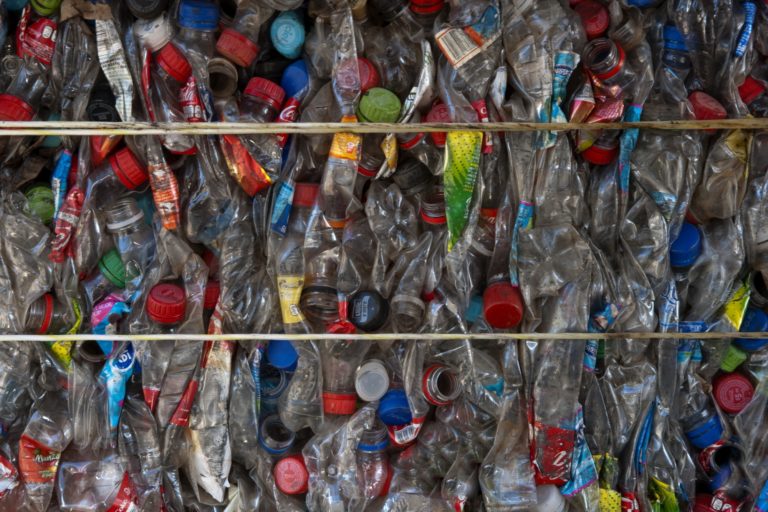
Co-written by Marc Yaggi and Gabrielle Segal
Because consumers are clamoring for clean energy options, which are increasingly competitive with fossil fuels, studies predict that the demand for fossil fuels will peak in the next few years. The fossil fuel industry has long known that it is on its way to extinction, which is why it has spent so lavishly buying corrupt politicians to help it squeeze every last drop of oil out of the ground. They also know that even the most corrupt public officials can’t fully stave off clean energy’s advantages in the market. Consequently, the industry has turned to another industry to prop it up: plastics.
The fossil fuel industry already plays a significant role in the recent proliferation of plastics — and plans to play an even greater role. The U.S. Energy Information Administration notes that “[p]lastics are produced from natural gas, feedstocks derived from natural gas processing, and feedstocks derived from crude oil refining.” Studies predict that by 2050, plastics will account for about 20 percent of total oil consumption, up from around 8 percent today.
The industrial plants that create chemical products derived from petroleum, called petrochemicals, are essential for plastic production. The rapid growth of the petrochemical industry is directly linked to a recent boom in U.S. shale production. Since the shale gas boom, fossil fuel companies such as ExxonMobil Chemical and Shell Chemical have poured more than $180 billion into new “cracking” facilities, where petrochemicals are processed and produce materials to make plastics. These new facilities are projected to increase plastic production by 40% in the next decade
To help pave the way for their plastic production investment and stay viable, the oil and chemical industries are teaming up with the American Legislative Exchange Council (ALEC) to forestall efforts to regulate plastics. In response to successful municipal bans on plastic bags, numerous state legislatures have adopted preemption policies; in other words, they are enacting a “ban on a ban.” The prohibitions strip local governments’ authority to manage waste and ensure an open gate through which industry can flood the state with their single-use products.
Similar to scams perpetrated by Big Tobacco and climate deniers, the industry is attempting to dignify plastics as they produce more of it. A Dow employee has stated they are working to “correct the commonly held negative stereotype that plastics are polluting the environment due to waste management issues.” Fossil fuel and petrochemical industries carefully construct language that makes it seem as if plastic production is good for our environment. This is simply untrue.
Plastics pollute our waterways and oceans and overflow our landfills. Petrochemical plants release chemicals into the atmosphere and produce massive amounts of greenhouse gases, significantly contributing to climate change. Because the petrochemical industry is reliant on fossil fuels, it runs the risk of oil spills and other fossil fuel disasters. Fracking, the main method of producing shale gas, has numerous harmful impacts, from methane migration into aquifers to fugitive emissions.
Communities living at the frontline of petrochemical plants face the added dangers of air and water pollution, especially in the wake of a natural disaster. One such case took place in Texas after Hurricane Harvey, when explosions at Arkema chemical plant outside Houston forced nearby residents to flee. Additionally, drinking from a plastic water bottle likely means you are drinking noxious plastic fragments.
Fossil fuel companies are turning to plastic production in a desperate attempt to secure their financial future. Both Dow Chemical and Saudi Aramco, Saudi Arabia’s national oil company, see the benefit of turning to petrochemicals and plastics “as the future of its oil industry.” Aramco has invested in petrochemical plants to produce chemicals used to make plastic. The crude oil company’s focus on petrochemicals is emblematic of how the fossil fuel industry is preparing for a world where it is no longer the main product used to create energy.
It is up to us to ensure the fossil fuel industry’s plot to stay relevant fails. Our communities’ continued phasing out of fossil fuels and the growing awareness of plastic pollution can have a powerful impact on the industry’s investments in a plastic future. For this Earth Day and beyond, support plastic bans in your community, tell your state legislators to resist preemption legislation and consider plastic-free alternatives wherever possible, so we can keep fossil fuels in the ground for good.
Feature image by BIONIC